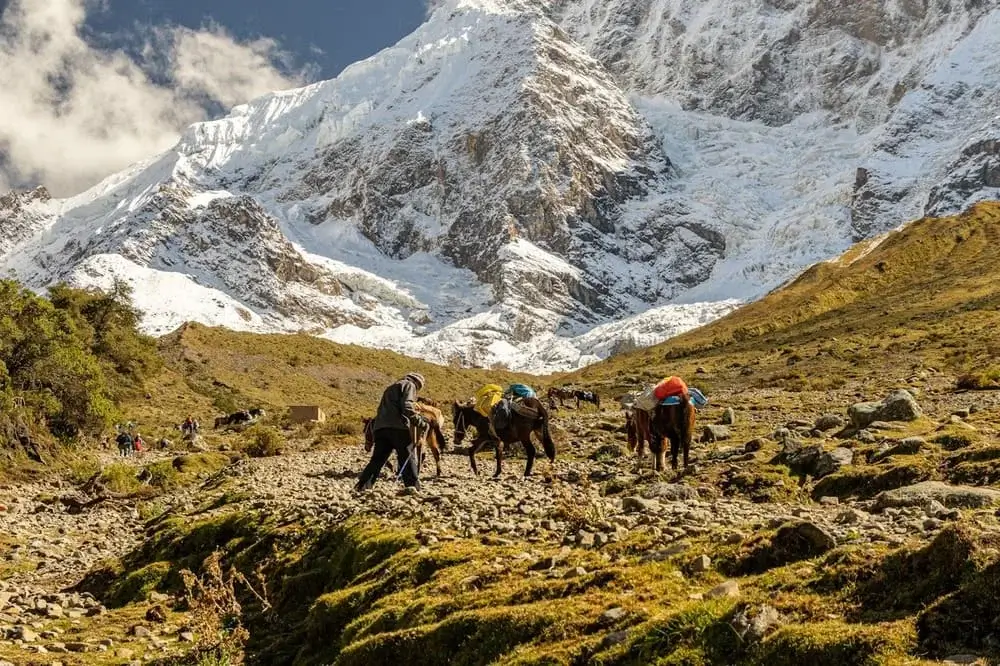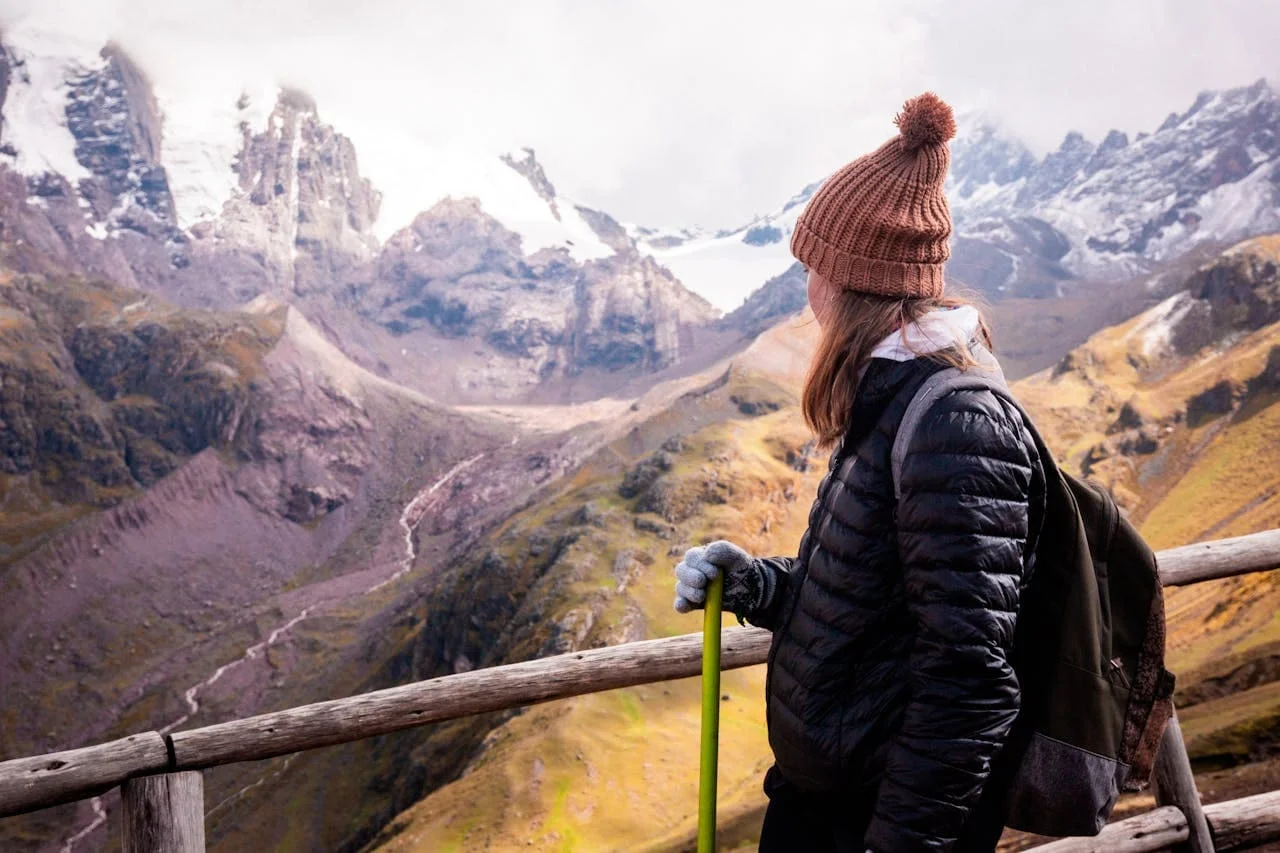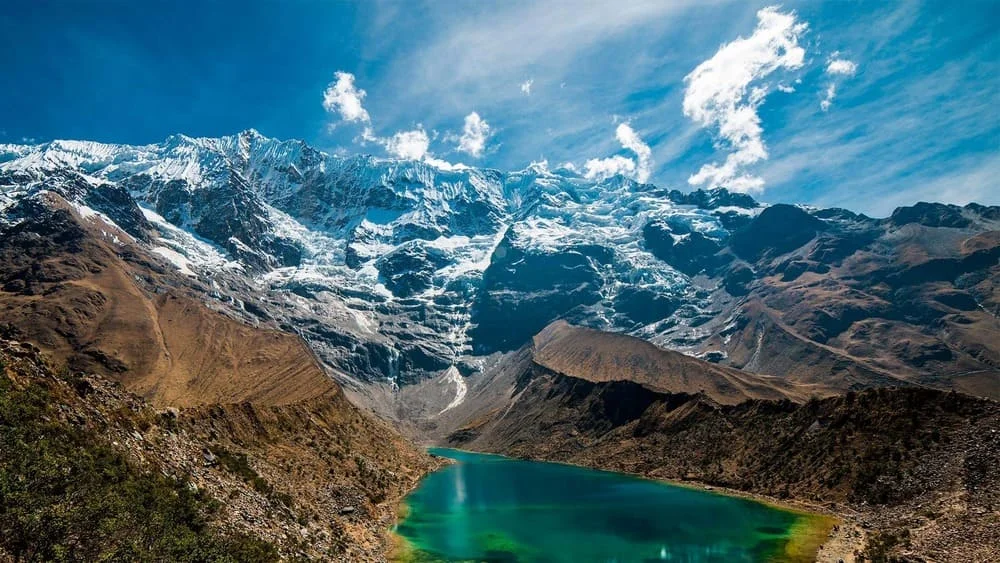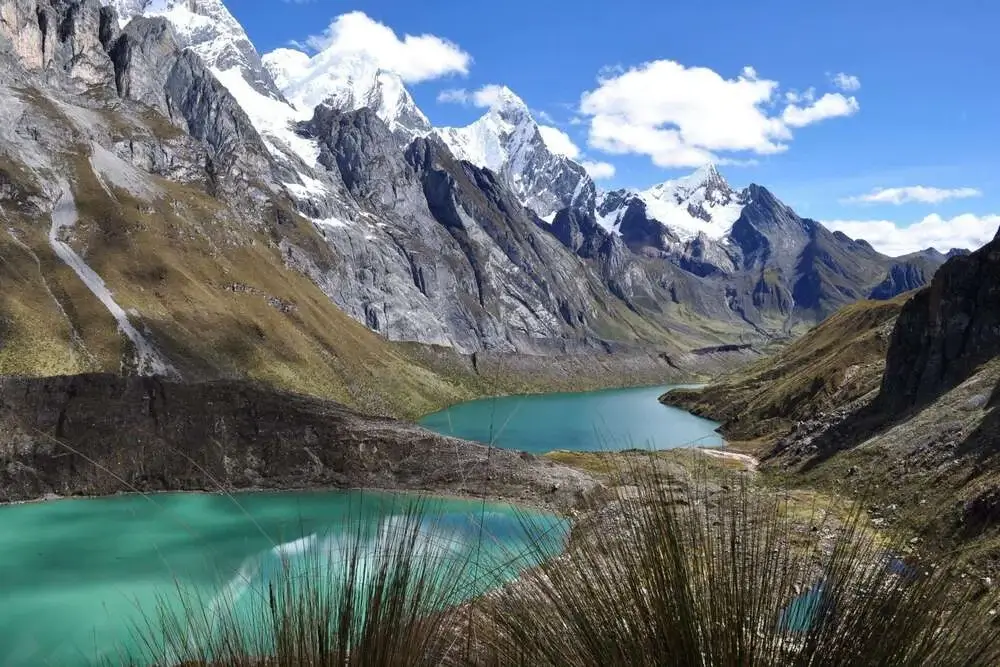When travelers imagine Peru, they often picture Machu Picchu, the Amazon, or golden deserts. Yet, the Peruvian Andes hold a hidden surprise: snow-capped mountains and glaciers. Towering over 6,000 meters, these peaks offer adventure, culture, and breathtaking scenery.
“Snow in Peru is rare in cities but constant in the high Andes, where sacred Apus dominate the landscape.”
Whether you’re trekking, seeking cultural immersion, or simply want to see snow in a tropical country, Peru offers unforgettable experiences.
Snow in Peru: What You Need to Know Before Traveling
Snow isn’t everywhere in Peru. It mainly occurs in the Andean highlands above 3,800m.
- Dry season (May–September): Best time for treks and clear views.
- Rainy season (December–March): Heavier snowfalls, but trickier logistics.
- Altitude factor: Expect cold nights, even if days are sunny.
If you plan to see snowy peaks, spend time acclimatizing in Cusco or Huaraz before high-altitude treks.
Snow in Peru: Quick Facts
A fast overview before diving deeper:
- Snowfall Regions: High Andes, mainly above 4,000 meters (13,000 ft)
- Highest Snow-Capped Peak: Huascarán (6,768 m / 22,205 ft)
- Where to See Snow: Cusco, Huaraz, Arequipa, Puno, Ancash
- Best Season: Dry season (May–September) for clear skies and stable conditions
- Popular Treks: Ausangate, Salkantay, Huayhuash, Santa Cruz, Alpamayo
- Altitude Warning: Snow regions = high elevation, acclimatization required
- Travel Tip: Snow in Cusco is rare but does happen — most recently in 2023, when the city woke up covered in white.
Best Places to See Snow in Peru
From world-famous mountains to remote glaciers, here are Peru’s most iconic snowy landscapes
| Mountain / Region | Height | Highlights |
|---|---|---|
| Huascarán (Ancash) | 6,768m | Highest mountain in Peru, glaciers, turquoise lagoons |
| Alpamayo (Ancash) | 5,947m | Voted “the most beautiful mountain in the world” |
| Ausangate (Cusco) | 6,384m | Sacred Apu, home to Qoyllur Rit’i festival & 7 Lakes trek |
| Yerupajá (Huayhuash) | 6,634m | Second highest in Peru, remote alpine circuits |
| Coropuna (Arequipa) | 6,425m | Peru’s highest volcano, revered in Andean tradition |
| Rainbow Mountain (Cusco) | 5,200m | Often covered in snow during early mornings |
Popular Snow Treks in Peru
Peru offers some of the world’s best high-altitude hikes.
1. Ausangate Trek (Cusco)
- Altitude: 6,384 m
- Duration: 5–6 days
- Why Go: Glacier lakes, alpaca herds, snow-covered passes
- Difficulty: Challenging — high-altitude trekking
- Highlight: Often combined with a visit to Rainbow Mountain (Vinicunca).
2. Salkantay Trek (Cusco)
- Altitude: 6,271 m
- Duration: 4–5 days
- Why Go: Alternative route to Machu Picchu, stunning snowy peak views
- Difficulty: Moderate to Challenging
- Highlight: See snow on Salkantay Pass before descending into cloud forests.
3. Cordillera Huayhuash Trek (Ancash)
- Altitude: Up to 6,635 m (Yerupajá)
- Duration: 10–12 days
- Why Go: Considered one of the world’s most beautiful treks
- Difficulty: Challenging, remote and rugged
- Highlight: Endless snowy ridges and turquoise glacial lakes.
4. Santa Cruz Trek (Cordillera Blanca)
- Altitude: 4,750 m (Punta Unión Pass)
- Duration: 4 days
- Why Go: Accessible classic trek with sweeping snowy vistas
- Difficulty: Moderate
Guided treks ensure safety, acclimatization, and insider knowledge. Take a look at the best Hikes in Peru: Top Trails, Tips & Routes
Best Season to See Snow in Peru
- Dry Season (May–September): Clear skies, easier access, colder nights.
- Rainy Season (December–March): More snowfall, challenging logistics, lush landscapes.
Takeaway:
- For adventure treks → choose the dry season.
- For chance of snowfall in Cusco → rainy season sometimes brings rare snowstorms (like May 2023).
📌 Quick takeaway: July and August are the most popular months for trekking and snowy landscapes. You can read more about the best time to visit peru here.
Safety Tips for Snow Travel in the Andes
- High-altitude snow travel requires preparation:
- Acclimatize for at least 2–3 days in Cusco or Huaraz. Read our blog on How to Avoid Altitude Sickness in Cusco.
- Carry proper layers, gloves, and waterproof gear.
- Hire local guides for navigation and safety.
- Drink coca tea and stay hydrated to ease altitude effects.
Travel smart, and the snow will be magical rather than overwhelming.
Snow, Culture, and Traditions
Snow in Peru isn’t only about landscapes it’s deeply tied to Andean spirituality.
- Qoyllur Rit’i Festival (Cusco): Thousands of pilgrims journey to Ausangate, blending Catholic and Andean traditions.
- Apus (sacred mountains): Snow-capped peaks are considered protectors of local communities.
“For Andean communities, snow-capped mountains are not just scenery they are living beings, guardians of water and life.”
Witnessing snow in Peru often means experiencing a cultural connection unlike anywhere else.
The Cultural Meaning of Snow in Peru
- Snow in Peru isn’t only about landscapes it carries deep spiritual meaning.
- In Andean cosmology, snowy peaks are Apus, sacred mountain guardians.
- Many communities make offerings (called “pagos a la tierra”) to the Apus for protection.
“The Andes are not just mountains they are living spirits that protect us,” say Quechua elders.
Packing Guide for Snow Adventures
- Thermal base layers + fleece + windproof jacket
- Hat, gloves, scarf
- Hiking boots with good grip
- Wool socks (several pairs)
- Sunglasses & sunscreen (UV is strong at altitude)
- Sleeping bag (-10°C or lower for treks)
- Water bottle + purification tablets
- Snacks & hydration packs
- Trekking poles
If you wanta complete list on What to Pack for Peru read our blog.
Travel Responsibly in Snowy Peru
- Stay on marked trails to avoid erosion.
- Support local communities by booking community-based tours.
- Minimize plastic use in remote areas.
- Respect sacred sites near snow-capped peaks.
Snow in Peru is more than a weather phenomenon it’s a window into the country’s raw beauty and cultural richness. From rare snowfalls in Cusco to epic treks in the Cordillera Blanca, these experiences are unforgettable.
Whether you dream of hiking beneath Ausangate’s snowy glaciers or witnessing a festival on sacred peaks, the Andes deliver.
Ready to experience the magic of snow in Peru? Book your custom Andean adventure with Andean Travel Experience today. Our expert guides will take you to the most breathtaking snow-capped landscapes safely, authentically, and sustainably.




